Pathological Science #11 March for Science Appeal to Authority Signs
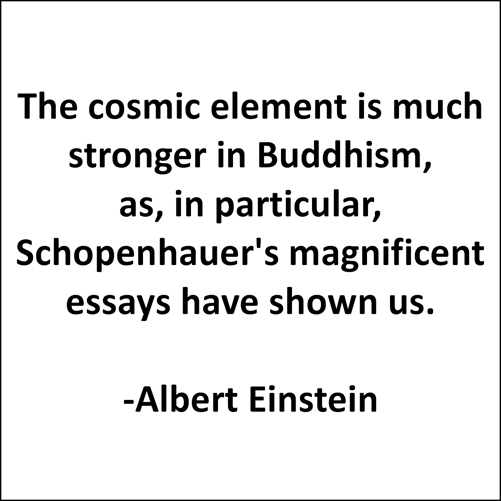
©2018 Larry Gowdy - Albert Einstein's Appeal to Authority
Copyright ©2017-2021 - updated February 09, 2021
Being Right is not Always Being Correct
An interesting observation is that most all humans appear to want to be right (all other species might be similar). Even when an individual chooses a wrong belief that they apparently know is wrong, still they appear to choose the wrong belief because the individual thinks that the wrong choice is for the right reason. Too, even when an individual does not care to be right about a topic, still the individual appears to choose to be 'right' by not caring to be right. I find that to be very interesting, and it also makes me wonder if it is even possible to choose a choice that is believed to be wrong.
However, my observation was based upon the interpretations of how I myself might choose a choice, and since I cannot know the minds of other people, and since many people cannot observe their own thoughts — some scientists claim that their choices are made unconsciously — then I can never know if other people actually do choose choices, or if perhaps the individuals merely unconsciously react upon emotional urges or some other cause.
Nevertheless, although most humans might appear to want to possess correct knowledge and to sum correct conclusions, still there is a difference between what is right and what is correct.
Being right about a system of belief might be right in the eyes of other individuals' who share the same belief, but still the belief can be incorrect. Sciencians are right about how the brain holds all consciousness, all thoughts, and all memories, but only right within the shared belief of Sciencism: the belief itself is incorrect.
It is easily observable that most humans do not care about being correct. Very few individuals will devote a decade of their life researching a single topic with the aim of understanding what is correct; most people just want to memorize a few words from a book and then claim that they are right. Want to know what beauty is? Read a book. Want to know what love is? Read a book. Want to know what Buddhist enlightenment is? Read a book. Want to know why the hexagon shape exists at Saturn's north pole? Read a book.
It is extraordinarily rare for a human to yearn for correctness. A simple thing like love requires a lifetime just to begin recognizing some of the variables and potentials that are possible within love, and since love is an open system with no boundaries, then it can never be fully known because not all variations of love can be understood through firsthand experience. Anyone who claims to know all about love, the individual might be academically right, but always be profoundly incorrect.
The many ancient symbols carved on stones and walls might mean one thing to one group of individuals, but mean something else entirely to another group of individuals. Saturn's hexagon shape, for example, has a fully different meaning to individuals who have invested decades into researching a parallel topic. The origins of the hexagon shape existed prior to man, and though man might be 'right' within the belief that the hexagon shape itself is mathematical, still the belief is incorrect.
And it is there that one of the answers exists of man's interesting behavior: most people want to be right about topics such as science, but the people do not care to be correct: the people merely want to be socially right as an authority over other people. Typically, individuals who care about being correct will not care what other people believe, but people who only care about being right will not care about being correct.
And how can the normal person believe of themselves to be right about a science topic? The people do it by claiming that whatsoever is written in science books is right. I find this normal human behavior to be intriguing because it displays so many different simultaneous contrasts within the human creature. Contrast the humans who want to be [a] correct while [b] not caring about authority, with the humans who want to [b] care about authority while [a] not caring about being correct.
The differences are real, very easily observed, and each group displays their own general behaviors: people who want to be correct are as Researchers and hermits, while the people who want to be right are as Sciencians and protesters who demand that everyone else believe in the Sciencians' pseudo-authority.
Somewhere between the desire to be right, and the desire to be oppressive upon other people, there is formed the desire to worship the authority that made the 'right' people right: in this case, Sciencism.
The religion of Sciencism relies upon the appeal to authority fallacy. When topics of discussion are raised, Sciencians claim 'science proved this, science proved that', while the Sciencians themselves know nothing of the topics, nor can the Sciencians so much as adequately explain or reason what the topics are. To Sciencians, Science is the ultimate authority of all true knowledge, and Sciencians believe that the act of reciting the name of science is enough reason for everyone to accept the Sciencians' words to be true truth. (To me, the Sciencians' profession of faith is similar to another religious belief: "That if thou shalt confess with thy mouth the Science, and shalt believe in thine heart that Science... thou shalt be saved" (Romans 10:9, King James version modified for illustration). Sciencians' appeal to authority is as religious as any other religion.)
An easy illustration of Sciencism is the popular claim that Science has proven that all consciousness, all thoughts, and all memories are in the brain's electrical activity. If so, then what are the voltages, amperages, frequencies, and wave patterns of everyone's brains? The voltages and amperages can be rounded-off in zeptos, but the frequencies and patterns must be exact. Of course no one can answer correctly because no one knows, including science. The brain beliefs are based upon an inference that some electrical activity had been observed to occur in different regions of some people's brains during different mental states, and therefore somehow the 'electrical' activity allegedly proved that all mental activity was occurring in the brain, but there is still no proof that consciousness, thoughts, and memories exist in the brain. Sciencians' inability to state voltages, amperages, frequencies, and wave patterns is sufficient evidence that the Sciencians believe in a thing that the Sciencians know nothing of, but the Sciencians do have faith in their Science, and the Sciencians continue to appeal to the authority of Science as being the true truth that allegedly supports the Sciencians' false beliefs.
Science is not the ultimate authority, nor are the scientists. Look at the pictures of Saturn's north pole hexagon, and explain with great detail what the shape and the inner storms imply relative to natural physics. The hexagon shape suggests an event that is one of the most important and 'wow' things in the known universe. (I chuckled when seeing that some people are saying that space aliens created the hexagon: the people know so little that they attempt to explain all unknowns by inventing religious-like appeals to higher authorities. I did not smile when seeing the news media claiming that scientists claimed that atmospheric storms caused the hexagon.) It is okay if you cannot explain the hexagon, because very few individuals would know, and those individuals who would know have invested their lives into researching the very topic, a topic that will never be written of in books. The many different symbols carved upon ancient stones were never publicly explained, and when an individual claims to be right because of what a book (or news article) states, in so doing the individual has also proven themselves to be incorrect. The popular belief of science being correct, is an incorrect belief.
March for Science Appeal to Authority Signs
Most school children have been told the wonderful stories of the great science man Albert Einstein, and unless an individual has invested time into actually reading what the fellow wrote, then it is to be expected that the public would assume that Einstein was the ultimate genius and 'holy science man' that the schools and public claim him to be (stores actually sell posters of Einstein's face that are larger than those of the Buddha and Jesus posters; go figure).
Several years ago, while I was writing a couple non-science articles, I had remembered a few Einstein quotes that were parallel to my own articles' topics, and so it seemed to be an acceptable thing to do to decorate my articles with the little Einstein quotes off to the side.
If an article is about love, then tossing-in a Jesus quote is rational, and if an article is about awareness, then tossing-in a Buddha quote is rational: decorative quotes within a paper merely point to a popular idea, without the article necessarily promoting nor claiming that the quotes' authors are the sole source of true truth (no fallacy of an appeal to authority).
If all known scientists and everyone you have ever personally known have said that a man was the world's greatest genius-scientist, then it is to be expected that if there had been a flaw in the man, then surely the flaw would have become public knowledge within the sixty years since his death. The assumption might have been reasonable, but the evidence disagrees with the assumption.
Later years, when I was pouring through books doing research on a different topic, I happened to read one of Einstein's books. Feeling upset with my mistake of having used Einstein quotes, I quickly edited my articles to remove as many references to Albert Einstein as feasible. I then read several more of his books, and within each was the same thing: Einstein made stuff up — really dumb pathological science stuff — and then he turned around and contradicted himself, not just a couple times, but hundreds of times and on all topics. At last count, I was only able to find three of Einstein's opinions that were at least partially valid and had not been completely contradicted by his other opinions.
I wrote reviews of his books, but I chose to not publish the reviews because Einstein is worshipped as if a science god, and it would serve no good purpose to publicly spank the ghost of Christmas never.
So, a lot of people have made the mistake of assuming that Einstein was great because everyone else has assumed that he was great — Einstein's greatness was a really good PR job — and though it might be embarrassing to use an Einstein quote as decoration in one's non-science article, it is far more embarrassing to quote Einstein in a science paper.
The March for Science signs that quoted Einstein would not so much as be acceptable to historians, and the quotes are far less acceptable to science.
Science is supposed to be about evidence, proof, valid reasoning, and a lot of hard-core research. It is contradictory and an opening for ridicule for a pro-science protester to carry a sign with quotes of Einstein's personal opinions. The signs proved that the protesters either had no knowledge of Einstein, or else the protestors were not able to cross-light the contradictions, or both.
And once again the March for Science protests proved that the protesters did not themselves follow the teachings of science, else the protesters would have invested a few minutes of research to verify their 'science' claims. The protesters merely made stuff up, grabbed a quote that appeared to substantiate the protesters' desired beliefs, and then assumed that everyone else would assume that the protesters' demands must be valid because the great science man Einstein had said something similar. The protesters had not merely made the fallacy of an appeal to authority, the protesters had also opened themselves to ridicule from everyone who has read Einstein's works.
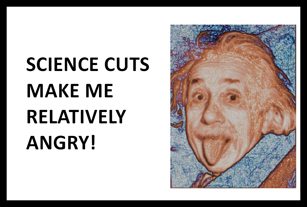
That sign was sort of cute and sensible enough in its own way, but it would have been much better for the sign to have not expressed negative emotions, nor to whine about not receiving government handouts.
The sign would also be applicable for the March for Science Hate Signs page.

I will first quote Einstein's actual wording within the source's context:
"This topic brings me to that worst outcrop of herd life, the military system, which I abhor. That a man can take pleasure in marching in fours to the strains of a band is enough to make me despise him. He has only been given his big brain by mistake; unprotected spinal marrow was all he needed. This plague-spot of civilization ought to be abolished with all possible speed. Heroism on command, senseless violence, and all the loathsome nonsense that goes by the name of patriotism - how passionately I hate them! How vile and despicable seems war to me! I would rather be hacked in pieces than take part in such an abominable business. My opinion of the human race is high enough that I believe this bogey would have disappeared long ago, had the sound sense of the peoples not been systematically corrupted by commercial and political interests acting through the schools and the Press.
The most beautiful experience we can have is the mysterious. It is the fundamental emotion which stands at the cradle of true art and true science. Whoever does not know it and can no longer wonder, no longer marvel, is as good as dead, and his eyes are dimmed. It was the experience of mystery - even if mixed with fear - that engendered religion. A knowledge of the existence of something we cannot penetrate, our perceptions of the profoundest reason and the most radiant beauty, which only in their most primitive forms are accessible to our minds - it is this knowledge and this emotion that constitute true religiosity; in this sense, and in the alone, I am a deeply religious man. …Neither can I nor would I want to conceive of an individual that survives his physical death; let feeble souls, from fear or absurd egoism, cherish such thought." (Einstein Ideas and Opinions, 1954 Crown Publishers, Reprint by Wings Books (likely 1988))
Within the first paragraph alone were the words "abhor, despise him, plague-spot of civilization, ought to be abolished, loathsome nonsense, I hate them, vile and despicable, abominable". Similar to the March for Science hate signs, Einstein was a hater, an individual who denied their own science of the physical and mental damage caused by negative emotions. Einstein was not pro-science, he was merely pro-himself, and not very bright at doing so.
In the second paragraph Einstein exhibited an utter ignorance of emotions, art, science, the mind, the body, and religions, along with a stunted knowledge of physics itself, while he also claimed to supernaturally know all humans' minds and emotions (no, humans are not identical as Einstein inferred). Einstein openly denied even the most elementary of physics when he claimed "The most beautiful experience we can have is the mysterious" (there are ancient symbols carved on rocks and walls that suggest that humans thousands of years ago had a better grasp of the physics topic than what Einstein could ever imagine). Einstein's claims were so pointedly wrong that it is disconcerting that the public still thinks well of him. Einstein's opinions were opinions, very ignorant opinions made-up to fit his unconscious "most primitive forms are accessible to our minds" desires. Opinions are opinions, everyone has one, but an opinion does not make the claim true, nor does placing Einstein's name beside his irrational opinions make his opinions true.
Einstein rambled at length of nonsensical opinions and claims, but still the public and sciencians worship Einstein's own 'heroism' in science.
"It is our sacred duty; for they are sacrificing themselves for the soul and the repute of the entire Jewish people."
…The publication of my book in the language of our fathers fills me with particular delight. …This revival of our tongue constitutes an important factor in our struggle for independence." (Einstein Ideas and Opinions)
Einstein contradicted his "loathsome nonsense that goes by the name of patriotism" when he repeatedly spoke of his own patriotism towards Israel and his race. Einstein was a hater, a racist, and a hypocrite. (Rumor has it that he was not so much as a good husband.)
Yes peace is the preferred choice, but for as long as there are violent humans, there will also be a need for militaries.
Why is science inventing new weapons of war, while doing nothing to help create the positive lives that would not need weapons nor militaries?
I am even inclined to go a step further by the assertion that, under present day conditions any one state would incur no appreciable risk by undertaking to disarm - wholly regardless of the attitude of the other states.
If such were not the case it would be quite evident that the situation of such states as are unarmed or only partially equipped for defense would be extremely difficult, dangerous, and disadvantageous - a condition which is refuted by the facts." (Cosmic Religion : With Other Opinions and Aphorisms, Albert Einstein, Covici-Friede, 1931. Reprint: Einstein on Cosmic Religion - And Other Opinions & Aphorisms, With an Appreciation by George Bernard Shaw, 2009, Dover Publications, Mineola, New York.)
Einstein's claims of humanity, militaries, history, religions, education, and other obvious experiences of life were extraordinarily wrong and bent to fit his own peculiar fantasies. Einstein was wrong many, many times, and the March for Science protesters brought ridicule upon themselves for quoting Einstein.

But Einstein contradicted that opinion by stating that he wanted Israel to be well-armed while other nations disarmed. Einstein also personally participated in helping the Allies kill German and Japanese men, women, and children. According to Einstein's own claim, he was a murderer because he participated in killing under the cloak of war.

And what, exactly, is that supposed to mean? Why did Einstein bemoan other people's behavior while he expected the other people to do what he himself would not do? Why did Einstein not do more himself? Why did Einstein claim that Israel must be given weapons for war?
Since when has science eliminated any war? What does science have to do with war except for science creating the weapons that are used to kill people in wars? Science does not teach kindness, politeness, mindfulness, caring for others, positivity, nor peacefulness, but Sciencians do teach hate and callous disregard for others.
Science is the world's mightiest religion that could influence man into ceasing wars, but no, science will not do that, partly because Sciencians are so hateful, and too, science would not know how anyway.
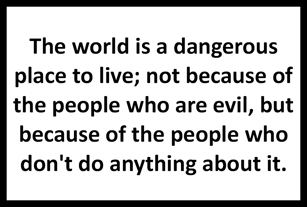
And which protester has done anything about it? None? And too, the logic is all wrong; if there were no evil people, then there would be no danger. Blaming the victims is an extraordinarily hateful and ignorant thing to do, and often done by the evil individuals themselves. (A man angrily and very loudly accused me of immorally owning a high-capacity rifle, the same rifle that I was pointing at him and preventing him from breaking into my home and murdering my family (he was screaming death threats so loud that the police dispatcher could hear him over a phone that was located in another room). To me, Sciencians and the man are very similar; a lot of hate and bipolar yelling while wanting to hurt other people.)
And what is a person to do when evil people become violent? Is the person expected to lie down and accept whatsoever an evil person wishes to do? Or should the person stand up and say that the March for Science protesters are hatefully ignorant hypocrites?
According to Einstein's opinion, if I say nothing, then I am guilty of doing nothing, but if I speak-out, then by Sciencians' opinion I am guilty of not accepting Science's hate. The fallacy of logic exists within the Sciencians' contradiction of claiming to be pro-science while also claiming to support the anti-science of Albert Einstein's.
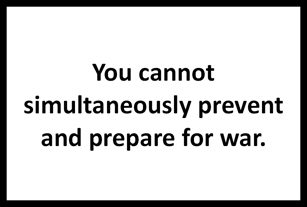
Then why did Einstein repeatedly cry that Israel should be given weapons to prepare for war so as to prevent war?

No, not true, simply not true, cannot be true; the opinion is a complete fabrication that is unreservedly false. Even if Einstein meant the comment to imply total global destruction of society, still the opinion was incorrect. Unless a person is claiming that Einstein had paranormal psychic abilities and could predict the future, then Einstein's claim was a mere exaggerated jest of opinion, and the quote was irrelevant to the protester's claims for science. The quote was more of an appeal to unconscious emotions, not an appeal to logic.
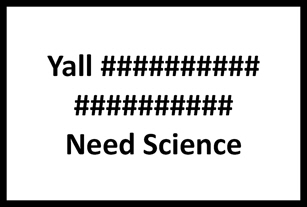
The sign quoted an allegedly well-known scientist who is still living. The vulgarity, racism, and hate were so disturbingly demented that I had to mark-out most of the wording. Yeah March for Science people, holding up signs like that earned you the Einstein award sign of "worst outcrop of herd life, abhor, despise him, plague-spot of civilization, ought to be abolished, loathsome nonsense, I hate them, vile and despicable, abominable" (Einstein's words, not mine). Carry your sign with the pride of knowing that you gave science yet another black eye.
Comments
The March for Science protests had other signs with quotes, but in none of the photographs of the marches did I see a quote that was sensible, nor so much as polite. To me, as a disinterested observer who has no stake in science, I interpreted the March for Science protests to be an expression of hate, greed, violence, unlearnedness, inexperience, and dysfunctional reasoning.
Imagine a world where people actually believed in their science, and the people actually chose for themselves to behave politely and kindly, with goals for the long-term betterment of the human species, and for the planet itself. Imagine the world having people being concerned for others, of people accepting responsibility for their own lives rather than mooching off of the public's taxed labor. Imagine a world where the people's soft voices are toned of self-reflecting thoughts weighed upon concerns to do no harm.
Maybe that world might exist in a distant parallel universe, but definitely not here, and never within Sciencism.